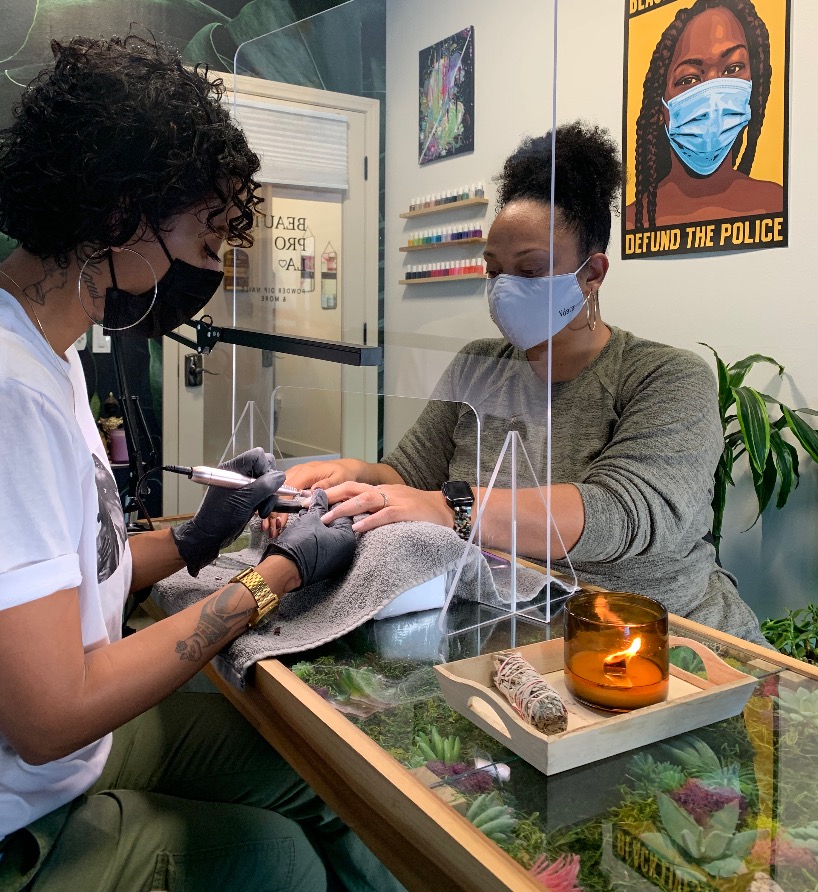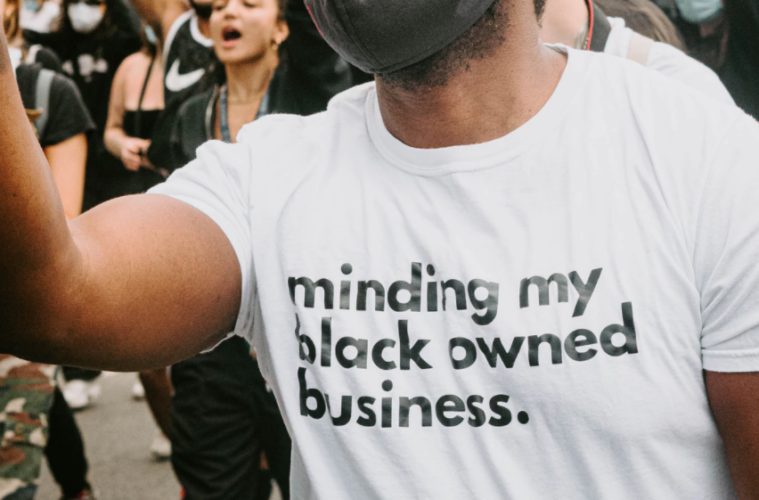It has been nearly a year since the COVID-19 pandemic flipped the U.S. on its head, with schools shutting down, professional sports leagues postponing their seasons and businesses across Los Angeles being asked to close.
The economic impact of the pandemic was felt almost immediately by Black-owned businesses in the U.S., as by April 2020, 41% of them were forced to close, compared to 32% of Latino-owned businesses, 26% of Asian-owned and only 17% of white-owned businesses, according to a report by the New York Federal Reserve.
The report connected the scathing percentage to two things; one being that Black-owned businesses have typically been located in COVID-19 hot spots. The other cause of the closures was attributed to federal aid, such as the Paycheck Protection Program, covering less than 20% of U.S. counties that are densely populated by Black-owned businesses.
“All of the things that they say are available as business resources, are not really available for Black-owned businesses,” co-founder of Black Lives Matter Los Angeles, Dr. Melina Abdullah told L.A. Weekly. “Even your ability to get those emergency funds, it really was dependent upon your relationship with banks and a lot of Black-owned businesses don’t have relationships with banks. This economic crisis is hitting Black workers really hard and even harder when we talk about Black-owned businesses.”
View this post on Instagram
Beauty Pro L.A., a West Hollywood salon that specializes in nail and waxing services, had its grand opening days before a state of emergency that forced many businesses to close their doors until there was more clarity on the coronavirus.
“We opened on a Monday and closed on a Friday. That’s how our business started,” Eleni Fields, co-owner of Beauty Pro L.A. said.

(Photo Courtesy of Beauty Pro L.A.)
Nail salons in particular were hit with stricter regulations than most California businesses, as one of the first reported outbreaks in the state came from a nail salon.
Through the early months of the pandemic, nail salons and other close-contact personal care services such as barber shops and tattoo parlors had to sit on their hands as they watched restaurants, shopping malls and several other sectors reopen before they did.
While Fields’ nail salon took an immediate hit, she and her business partner Sunshine Chung had a little luck on their side, as their landlord did not charge them for the time they were closed. They were also able to use the closures as an opportunity to maximize the vision of their salon.
“It gave us time to gather how we really wanted to present ourselves,” Fields said. “It gave us time to invest and sharpen our website and gain access with people in the community. Knowing how people felt about being in public, we didn’t want to open something where people felt unsafe.”
In early June, a social media push to support Black-owned businesses, anchored by Black Lives Matter, made waves across the country, as a concerted effort was made to raise awareness toward Black-owned shops and restaurants that were fighting their way through the pandemic.
The “Buy Black” campaign was inspired by a holiday-season campaign that Black Lives Matter started in 2014 called “Black Xmas.” The annual tradition was positioned to persuade people to shop at local Black-owned stores in lieu of doing their holiday shopping at major retailers.
Instead of limiting the “Black Xmas” campaign to the holidays, the concept has been extended and renamed, “Verified Black Owned,” but still provides the “Black Xmas” resources where one can search for Black-owned businesses, Black-run organizations and Black-run banks in their area.
It was that push to “Buy Black” that connected Beauty Pro L.A. and BLM Los Angeles co-founder, Dr. Abdullah, as the nail salon was highlighted on the “Verified Black Owned” website.
Beauty Pro L.A. became Abdullah’s go-to nail salon during the pandemic, which in of itself showed the effectiveness of the “Buy Black” campaign.
“This year was more urgent than ever because of the pandemic,” Abdullah said about the movement to buy Black. “We’ve been kind of leading much of that work, even though people don’t know that it’s us. It’s been really a struggle for Black-owned businesses and so that’s one of the reasons we’re so committed to making sure that we amplify Black-owned businesses. I know some of the businesses that I used to frequent are gone. I know Black business owners, like a good friend of mine who’s a barber… I have to check in with him on his ability to even eat. He was a really popular barber, but they shut down barber shops and he wasn’t able to make money.”
Although small businesses have been ravaged by closures, communities have rallied around their local favorites when possible.
“I’m happy and I’m blessed that people always support us, even before that, you know what I’m saying?” Craig Batiste, owner of Mr. Fries Man in Gardena, said. “The community, they’re always supporting us. We was never scared. Once you panic, you going to sink like the Titanic.”
From the moment the pandemic hit, restaurants and bars in the hospitality industry have had to work around curfews, prohibition of indoor dining, prohibition of outdoor dining and COVID-19 health and safety guidelines.
“At first, the hardest part was getting all the customers and stuff used to it,” Batiste said. “We tell them they got to wear a mask and they still want to take their mask off. A lot of them didn’t want to go by the rules.”
Dozens of sit-down restaurants that weren’t equipped to handle non-indoor dining were forced to shutter, while many had to adapt and operate through pickup or delivery services, only. Even through all those challenges, Batiste attributed his restaurant’s survival to the community and support he has continued to receive through the pandemic.
While the COVID-19 vaccine rollout has been far from ideal, with Los Angeles Mayor Eric Garcetti continually pointing out that the city is not receiving enough doses, vaccinations are still being administered and the troubling numbers that L.A. saw in early January are diminishing.
The week of Jan. 4 saw a peak in COVID-19 infection rates, but as of this writing, the Los Angeles Department of Public Health reported a 67% decrease in positive cases rates.
While the end of the pandemic feels more real than it has in months, only time will tell what type of damage will have been ultimately inflicted on Black-owned businesses. Dr. Abdullah noted projections that up to 50% of all Black-owned businesses may shutter when it is all said and done.
Even then, there are Black-owned businesses that have continued the fight with support from communities and even a mainstream movement to uplift the hard-hit sector.
“Support for Black-owned businesses isn’t just about Black support for Black-owned businesses,” Abdullah concluded. “We need everyone to support Black-owned businesses.”
Advertising disclosure: We may receive compensation for some of the links in our stories. Thank you for supporting LA Weekly and our advertisers.

